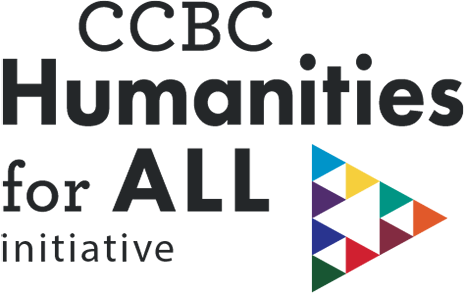New Beginnings: Dean Walker Talks Transitions and Humanities
Monica Walker is credited with bringing the Humanities for All initiative to CCBC, in partnership with John Hopkins University, in her role as Dean of the School of Writing, Literacy and Languages. As she transitioned out of the role, she sat down with CCBC student Akira Tisdale to reflect back on her role, responsibilities, and vision for the future. Below is a transcript of their conversation.
Akira Tisdale (AT): What are humanities to you?
Dean Walker (DR): When I think about the humanities, I’m drawn to this notion of what it means to study the human experience. I think about humanity and the humanities in terms of what it means to be human and our expression of humanity and the extension of that expression, whether it’s in our writing, or what we find in literature. And thinking about languages and how we express ourselves. I think about our history and all the various disciplines that come from that.
AT: When and how were you introduced to the humanities?
DW: Well, I can answer that in two ways. One would be as a freshman in my undergraduate program at James Madison University. I remember my first interdisciplinary seminar course. The instructor introduced us to a wide range of literature and asked the students to not only read the literature, but to reflect upon it, make those connections to humanity and to the humanities, and think about how the literature that we were encountering connected to our own experiences. It was definitely one of my favorite classes when I was an undergraduate student. I’m also thinking about being the daughter of a history professor at Morgan State University and learning the importance of studying the humanities, and the importance of knowing one’s history from my father.
AT: How have the humanities impacted your professional life?
DW: I didn’t always set out to study the humanities but when I became an adjunct professor here, I fell in love with CCBC and the opportunity to serve students and help them achieve their goals and fulfill their potential through the pursuit of higher education.
AT: How have the humanities altered your personal perspectives?
DW: I’ve been very fortunate throughout the course of my life to have been exposed to the humanities. Having been the daughter of two university professors, higher education culture has always been ingrained in me and is a part of who I am. And so I think for that reason, the humanities have always been a part of who I am.
AT: How has your connection to CCBC impacted your appreciation for the community?
DW: Well, our president always says “community” is our first name. I believe that to be true. This is a great community and I feel valued as a part of it. As an institution, my hope is that we continue to think about how we can draw folks into this great community. And this is a very diverse community. But not everyone can feel included, and so with that in mind, we want to ensure that, as an institution, and as a community, we are thinking about both diversity and inclusion together.
AT: Do you have a memorable or favorite experience at CCBC?
DW: Well, you know, I’ve been here 25 years next year, and so I have an era of experiences. I think the hallmark of my experiences for me has been the Humanities for All initiative. We’ve been fortunate to partner with Johns Hopkins University and sponsored and funded by the Mellon Foundation. It’s a multifaceted initiative and there are several components and elements to the initiative — I’ve never seen anything like it in terms of impact in terms of reach, in terms of student success. I’ve seen students get internships that have literally changed their lives. I’ve seen students who have never left the city of Baltimore get on an airplane and travel to cultural institutions across the United States and have their worldviews and perspectives change about their history. This has been incredible to watch.
AT: How do you feel that the Humanities for All initiative has progressed since it began?
DW: The initiative really started out when we started focusing on community colleges and university partnerships. We were thinking about unique ways to infuse high-impact practices and enrich our teaching and learning. In addition to Johns Hopkins, our students have been afforded the opportunity to visit other four-year institutions in our region to learn about transfer opportunities and to connect with other institutions around the country.
AT: What is one piece of advice you could give to a student considering the humanities?
DW: I’d want to encourage that student by saying studying the humanities will teach us about our shared humanity and make it clearer how we’re all connected. It’s amazing to me how we begin to care a little bit more about one another once we realize that. This experience will encourage students to reach out and serve others and their community because of what they’ve learned.
AT: How do you envision the humanities impacting CCBC moving forward from this point on?
DW: We’ve established an even greater foundation in terms of the culture that promotes care for one another and connection. Now with Humanities for All we have a system-wide or an institution-wide means by which we can carry that banner forward. I think that when students are considering the type of college they want to attend, they’ll think about CCBC because of the opportunities that are now available to them through the Humanities for All initiative.
AT: And my final question: what are you most proud of looking back over the years?
DW: I’m proud of so much. I’m proud of the fact that we were able to design an initiative that enabled us to fulfill a vision of achieving goals of student success. And the fact that we were able to do so in alignment with our mission. To make teaching purposeful, learning powerful, and community paramount. I’m proud that this will continue on and that will be a legacy for me.
To learn more about the Humanities for All initiative and how you can get involved, reach out today!

